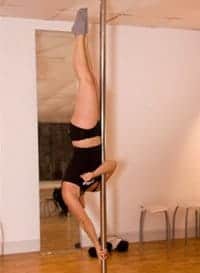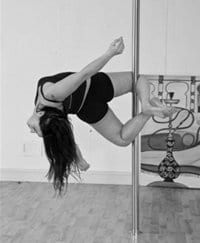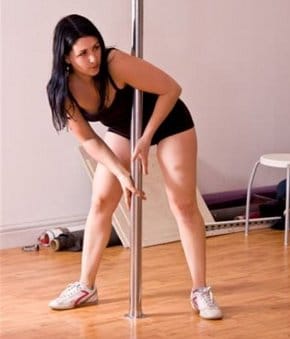A pole dance instructor is somebody who teaches others how to perform dance routines using a vertical pole as a means of delivering their fitness programme or entertainment programme.
Pole dancing became popular in the early 1980’s in gentlemen’s clubs and strip clubs in America and Canada, but nowadays it is recognised globally as a modern and beneficial form of fitness workout.
It requires significant strength, endurance and flexibility, and as such, a “pole workout” delivers both aerobic and anaerobic fitness training.
In reality, it is a mix of both dance and gymnastics.
Pole dancing as a form of fitness has become very popular in the last decade, with dance routines often figuring in music videos and in television programmes.
With this, there has been an increase in the demand for equipment and suitable instruction.
Some people who wish to learn pole dance, or use it as part of an ongoing fitness regime, sometimes choose to have a pole fitted in their home.
Those who wish to teach will usually either travel to the client’s home or preferred location (using collapsible equipment which they take with them), or they will rent or buy a studio, which is then used as the centre for instruction.
This is usually referred to as the dance “studio”.
Salary
The salaries within the industry vary greatly, and are subject to fluctuations in geographical demand.
It is usually remunerated hourly, due to the ever-changing structure of classroom-based instruction.
To begin with, instructors outside London can expect to receive £10 per hour, depending on the size of class and popularity of the school.
In the London area, this rises to around £15 per hour.
For an experienced instructor in the London area, this increases to £20 per hour, or £15 per hour for areas outside the capital.
Many instructors choose to set up independently and so are not dependent on becoming the employee of an established studio.
Responsibilities
- Maintain dance studio facilities so they are safe, clean and welcoming.
- Prepare class instruction, so as to deliver a programme which is suitable for student level of ability or pace of progression.
- Deliver the classroom-based programme.
- Organise parties and site-based activities for clients who wish to book an instructor
- Deliver site-based instruction to a level that will generally please the organisation which has chosen to book the event.
- Administrative duties for the business.
Qualifications
There are no formal academic barriers to entry.
Whilst it may be true that anybody can (theoretically) learn to pole dance, some people have a more natural ability to learn it, and so some experience of pole dancing, street dance or disco can be beneficial.
Some people also are able to deliver classroom-based instruction to others more easily, and so some experience of being in charge of a group-based activity is also very helpful.
Skills
- Ability to organise a lesson plan in advance of the class.
- Understanding the importance of being punctual and courteous is essential.
- Ability to handle simple administrative tasks, and manage several concurrent class plans.
- Desire to build on and expand one’s own knowledge of this particular form of dance.
- Desire to pass on knowledge to others, and teach in a sympathetic way.
Working Conditions

Working conditions for a pole dance instructor can vary greatly.
Generally, instruction delivered in a dance studio is considered to be a medium-risk activity, on the basis that, as with any fitness training programme, there can be a risk of personal injury.
Care is required for one’s own personal range of abilities, and for the range of ability in the students being taught.
Site visits can be delivered anywhere, from an office environment, to a bar or hotel, to a private residence.
Care of the risks associated with these differing environments is essential, as the level of potential personal risk changes from site to site, and some common sense is required.
As with any fitness programme, consult a doctor or physician before commencing, and ensure that progress is made in a considered manner suitable to the candidate’s own level of ability or fitness level.
Experience
It is possible (and common) for candidates to become self-taught pole dance instructors, and many teachers choose to pursue this method of learning.
Because of the wealth of media and available information on the subject, it is not difficult to acquire or download introductory lessons, and so candidates can see if this is something which will appeal to them from the outset.
For those wishing to be taught before commencing on their own path towards instructing others, there are classes (of varying quality) which are available throughout the UK.
Candidates are advised to consult their local dance studio, fitness centre or community centre for further information.
Additionally, candidates can consult their local newspaper or community bulletin for news of local classes or site-based pole dance instruction services.
Employers
Due to the ever-increasing popularity of pole dance tuition, many of the established dance studios have had to expand their horizons to encompass this new dance style.
Elena Gibson’s school is possibly the most recognised in the UK, and has four locations in London Poledancingschool, but candidates will have the most success approaching small local studios in the first instance.
Image

Also known as…
- Pole dance performer
- Pole dance teacher
Related Jobs
- Fitness Instructor
- Dance instructor
- Dance Teacher
- Yoga Teacher
What’s it really like?
Carla Broughton is a self-taught pole dance instructor who teaches for Pole Twisters, her own business.
It is a successful dance instruction school catering to people in South and West Wales.

What made you decide to choose to get into this sort of career?
I went to see a show in London initially, and I thought to myself, ‘hey, I can do that’, so I purchased my own pole and taught myself how to dance.
After that I thought, why not teach others how to get involved with this fabulous form of exercise.
It started from there, really.
I began the business with my sister, Lisa, and that was in 2007. We now employ many teachers.
Do you have a standard day or a standard type of `exercise’?
Evening classes & weekend parties.
These are the two common forms of teaching format.
As a dance school, we specialise in many forms of dance, which includes pole dancing, burlesque, lap dance, can can, salsa and belly dancing.
Pole dancing classes are the most popular because people have realised what an excellent form of fitness it can be.
Our teachers also travel to deliver training for organised group activities, such as hen nights and birthday parties.
What is the most common type of problem/call-out/enquiry you must attend to?
Email confirmation with the customers.
People often forget that there is an administrative element to the business, and it’s important to get this right, or mistakes can occur.
What do you like most about the job?
The feeling of satisfaction knowing I’ve passed on skills to another person.
It is great to see somebody who is enthusiastic, willing to learn, and we can see them develop over time.
What do you like least about the job?
Filing.
The admin is a pain, as it is with many small businesses.
What are the key responsibilities?
The dance studio maintenance, class preparation, the actual teaching of the classroom-based lessons, the parties and the office duties.
What about academic requirements? Any formal demands, eg- A Levels?
These are not required, although “Exercise To Music” or a gym/fitness qualification would be a bonus.
Who is the longest serving member in your team/division?
Leah has been with us the longest, apart from myself and the other director/teacher, Lisa.
We are still a fairly new business, having begun in ’07.
What is the starting salary and how does this increase over time with promotion?
£10-15 per hour, with a yearly revision.
If you left this position, what else would you consider/prefer doing?
Teaching another form of fitness, or generally teaching anything.
I enjoy being able to pass on knowledge in whatever form.
How far is it possible to progress within the organisation?
In truth, not much further because I already have my own business.
But it is already an exciting enough position to be in without the hopes of promotion, etcetera.
Running your own business is a big challenge, and we have a responsibility to both colleagues and customers.
What advice do you have for someone who is looking to get into this as a career?
It can be difficult to begin a dance studio from scratch, especially one focusing on the newer or more niche dance styles such as pole dance or burlesque.
I suggest franchising with an established studio.
We, for example, offer everything to get set up in another area of the UK, or even internationally, if the potential partner so wishes.
Please see our web site or contact us for further information on the franchise process.
What are the most important qualities an applicant must/should possess?
They must be friendly, informative, knowledgeable, punctual, be able to use initiative and have a fun sense of humour.








